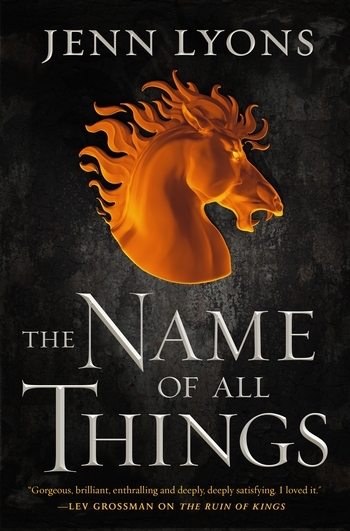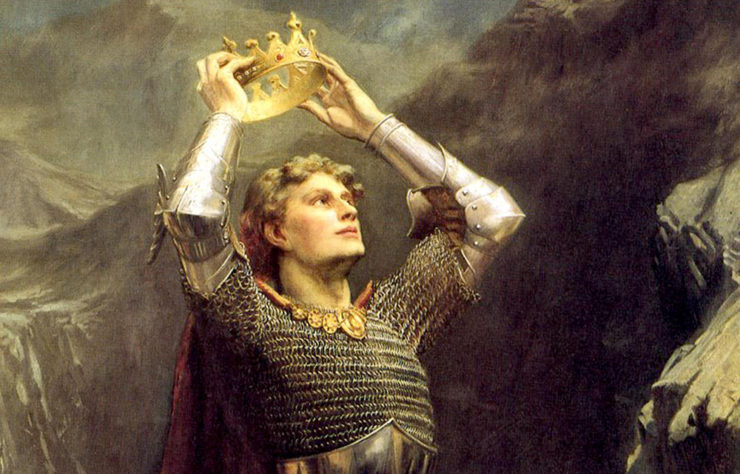A few years back, I had the good fortune to meet legendary sci-fi writer David Brin. He seemed a little disappointed to discover that I wrote epic fantasy, not science-fiction, but he did give me the following piece of advice, which I am determined to have picked out in cross-stitch, or perhaps tattooed: Never forget to interrogate the power structures.
Funny how a single imperative can resonate through your entire creative path.
Because I had honestly never even thought about the power structures in most epic fantasy stories. There are certain themes and tropes of the Eurocentric-dominated fantasy genre so entrenched, so endemic, that most of us have likely never questioned them, let alone interrogated them. Because when it comes to power structures in fantasy, there is typically exactly one answer.
Who’s in charge? Easy. A king. A king is in charge.
The title might change, sure. Maybe it’s a king or an empress, a duke or a sovereign, but the power structures in most English-written fantasy novels are, almost without fail, pyramids that come to a single point. And I, a woman who grew up on stories of Arthur and Aragorn, had never stopped to consider what it meant to approach these kinds of fantasy stories from the unthinking and automatic assumption that concepts of heroism and worthiness were intrinsically linked to ancestry. Or how deeply problematic that idea is.
Most of the fantasy stories I grew up on taught me that it’s perfectly acceptable, even ideal, for leaders to wield absolute power as long as they’re ‘good.’ Unfortunately ‘good’ is apparently a matter of genetics. King Arthur can only pull the sword from the stone because Uther’s blood runs through his veins. Aragorn might have had to prove his worth, but he wouldn’t even be in the running if he hadn’t been a descendant of the first king of Númenor.
Take a moment to think over your favorite epic fantasy books. Which ones don’t include monarchs? Which ones avoid the default assumption that the setting’s governing power structure is fundamentally autocratic? If you counted them out on your fingers, how many fingers would you have left over?
I don’t know about you, but I’d still have enough fingers left over to clench into a fist.
Now, lest you think me a hypocrite, please take note that my own books wouldn’t be on that list. Not a one. I have a hard time pointing judgmental fingers at any other writer when I am just as guilty of using these same tropes myself. It’s just so easy to the point of instinct to start out a story with a crown, with a throne, with a kingdom. There’s tension, a balancing act, in standing at the top of a pyramid.
But let’s stop and examine the other reasons why we do this.
Perhaps one of the most obvious answers is: because we’ve (‘we’ being western cultures) have always done it this way. The earliest fictional story that we know of—the Ballad of Gilgamesh—is, after all, a story of a king. Hercules? Son of the king of the gods and later, naturally, a king himself. Odysseus of the Odyssey? Of course he was a king. The idea of proving one’s worthiness to be a hero (or married by the hero) by being the child of a ruler, or better still, the child of a god, is very nearly a universal feature of European mythologies. The appeal isn’t difficult to understand; the people attempting to justify their power base would naturally find it convenient indeed to point to lineage and heredity as proof of authoritative right. And since then this has become a theme so omnipresent that it has taken on the substance of wallpaper—something always present but rarely seen. Taken as granted. Accepted without question.
A second factor which must be considered is perceived authenticity. Despite the fact that there is no rule which says fantasy stories must resemble medieval (European) society we still have a distressing tendency to insist that fantasy books be alternative histories with different place names and sorcery attached. And isn’t it more ‘authentic’ for such stories to have an autocratic rule, probably through a divinely-appointed hereditary monarch?
I suspect neither ancient Athens nor Rome (at least during certain segments of their existence) would see it that way. And what does the idea of ‘authenticity’ even mean anyway, in stories with magic, fabulous creatures, and fundamental laws of physics that laugh in the face of any so-called ideas of ‘realism?’ There are no rules in fantasy but the ones we make ourselves, and yet we insist on leashing ourselves to monarchies again and again.
Is it because the idea of a monarch is, fundamentally, simple? In its basic design easy to digest and comprehend? Perhaps. Certainly it is often simpler and easier to write a scene with a single ruler than describe the deliberations of councils, parliaments, and elected governmental bodies. Simpler, too, to understand such scenes. One or two parents—caring, indifferent, or abusive—is an easier idea for most of us to grasp than the consensus of the village, the politics of the social herd.
Buy the Book


The Name of All Things
But does it really matter if so many of our fantasy stories revolve around kings? These aren’t stories to be taken literally, after all. These are, by definition, fantasies. What’s the harm?
Maybe there is no harm at all, but…I have my doubts. We have always used our myths and stories to shape ourselves and weave order into our universe, to label, analyze, and finally tailor the fabric of our social structures. I look at a world that has, continually, in a cyclical pattern, turned to unique individuals to save us from ourselves, invested them with kingship and, continually, discovered that we have placed our crowns on the heads of villains. This is nothing new. The western world has been doing this, exactly this, for all of our history. Is this any one story’s fault? No, of course not. But an accumulation of stories? A growing mountain of tales sating our need for heroes, for rescue?
Does the slow accumulation of water have the power to wear away mountains and carve out the deepest canyons? Hmm.
I’ve not lost hope. Maybe it’s not too late to teach ourselves that we don’t need a king. That list of fantasy novels that don’t assume an autocratic government system may be small, but it’s growing: N.K. Jemisin’s Broken Earth series, both Alexandra Rowland’s Chant books (A Conspiracy of Truths and A Choir of Lies) Robert Jackson Bennett’s Divine Cities and Foundryside books, and K.A. Doore’s Chronicles of Ghadid books notably do not feature hereditary monarchies or autocratic variants thereof. And they are all marvelous.
Perhaps we need to new stories, ones where worthiness of our heroes is not derived from a DNA strand, or power of our governing best wielded by a single will. Or if we do write such stories, maybe we can find a way to ensure that this trope is not merely assumed but used as a tool to be wielded with precise intention and purpose. In much the same sense as gender, ability, mental health, sexuality, and race, we need to see a broader spectrum of representation than the default assumption of a single ‘right’ way.
Let us interrogate the power structures together.
Jenn Lyons lives in Atlanta, Georgia with her husband, three cats, and a nearly infinite number of opinions on anything from mythology to the correct way to make a martini. Her debut epic fantasy The Ruin of Kings is available from Tor Books; its sequel The Name of All Things publishes October 29th.










